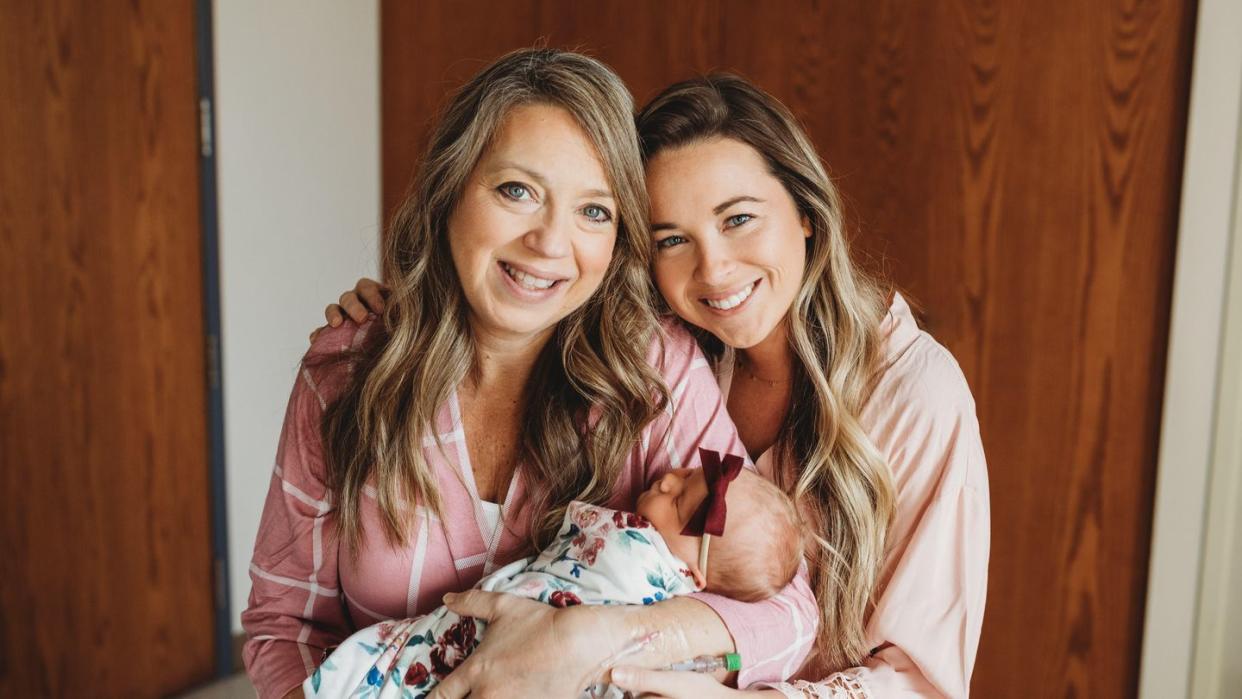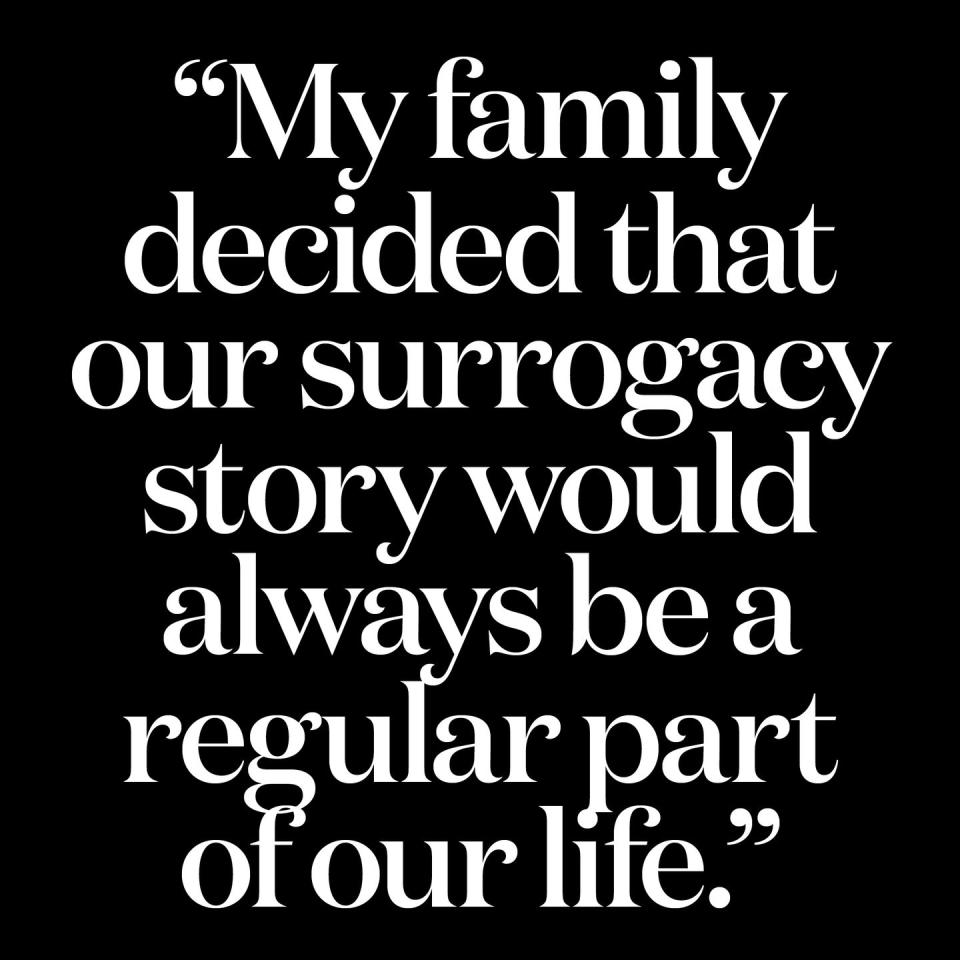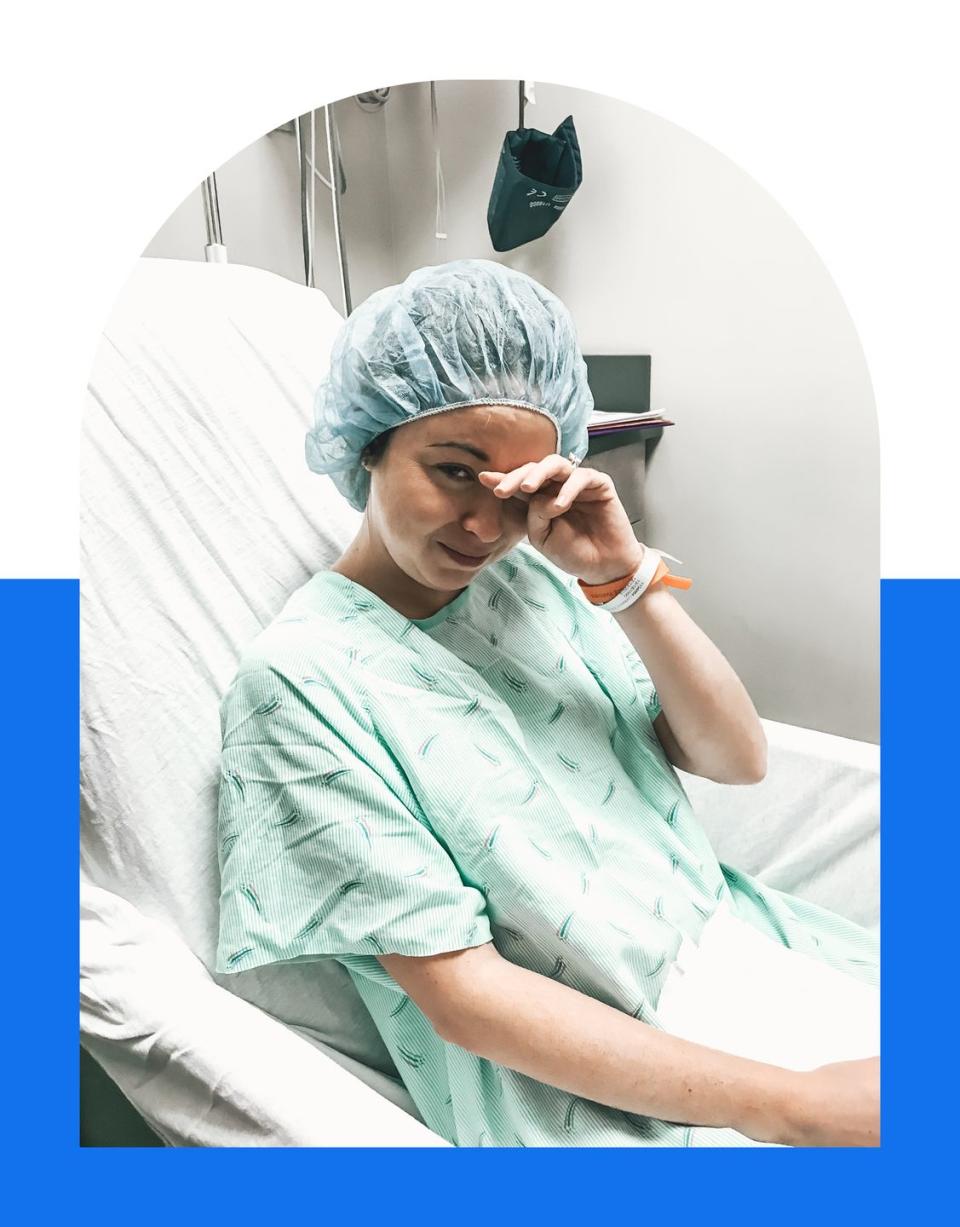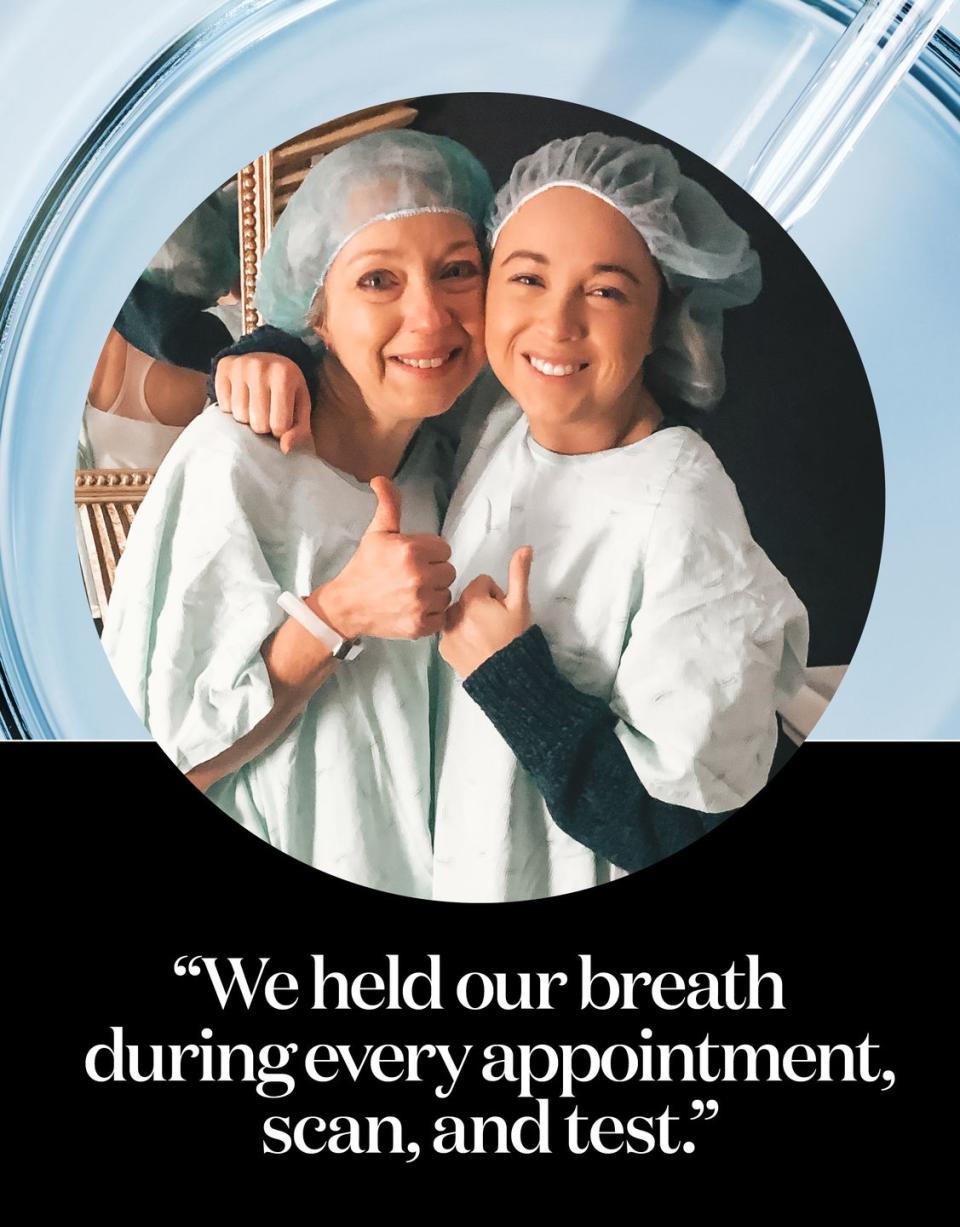‘At 51, My Mom Became My Surrogate—And Helped Make Me A Mama’

As soon as my daughter was born, the doctors handed her directly to me and the whole world stopped. She was healthy, perfect, and looked exactly like my husband. Our surrogate was also healthy, stable, and, officially, a grandma. My mom had helped make me a mama.
My daughter Briar is now 3. She is super spunky and has a big personality. She's kept us on our toes since the day she was born. And she knows she came from Grandma’s belly. They have an extremely close relationship and get to see each other almost every day. Briar is too young to fully understand the concept, but my family decided that our surrogacy story would always be a regular part of our life.
Looking back on it now, I know our unique journey taught me that there are so many different ways to grow your family, and surrogacy gave me hope that the door to motherhood was never fully closed. If one door shut, a different one could open.

My husband and I were high school sweethearts, and when we got married in 2016, we immediately tried to start a family. After eight months with no luck, I went to my ob-gyn, who referred us to a fertility specialist in Chicago. First, we tried intrauterine insemination (IUI), a procedure that boosts the chances of getting pregnant by placing a sperm directly in the uterus. The first round was unsuccessful, and I was impatient, so we switched to in vitro fertilization (IVF), the most effective type of fertility treatment, in which an egg is fertilized by sperm in a lab before being transferred directly into the uterus.
I ended up having six unsuccessful IVF transfers, including two that ended in miscarriage—once after the second transfer and then again with twins. I was also diagnosed with Asherman syndrome after my miscarriage with the twins due to damaged scar tissue on the inside of my uterus, making future pregnancies more difficult and high risk.
At the time, all my friends were pregnant, and I felt so isolated. Every month I built the strength to try another round of IVF, and each time it didn’t work out, I was crushed. It was a vicious cycle. Infertility also took a serious toll on my body. I was pumping myself with hormones, my body was changing, and I was fatigued, tired, and emotional. The countless procedures, blood draws, transfers, and exams were unpleasant and painful. It felt as if I were in medical stirrups every day.

Eventually, my doctor suggested we look into surrogacy. It took some time to come around to the idea, and of course, I also had extreme sticker shock. Surrogacy can run anywhere from $50,000 to $250,000, and honestly, we couldn’t afford it. Still, it felt like my only option at that point, so I was devastated.
“What if I was your surrogate?” my mom texted me one day.
The text came out of the blue. My mom was 50 at the time. She’s a two-time Boston marathon runner and triathlete and is incredibly healthy. She is my best friend, and I’m her only daughter, so we’ve always been close. But I was still processing my emotions after the failed IUI and IVF, so I told her to drop it. Her suggestion felt like a silly, unrealistic, outlandish idea, and I didn’t even want to get my hopes up. But she was persistent and continued to remind me that she was confident she could be my surrogate.
About two months later, at a routine checkup at the fertility clinic, my mom came to support me. At the end of the exam, my doctor brought up surrogacy again, and my mom chimed in saying she had offered to be my surrogate. I was a little annoyed and embarrassed because it felt like such a crazy idea. But the doctor was clearly considering the idea and offered to run some preliminary tests.
There was never an exact moment when we decided that my mom would be my surrogate.
As she passed each health screening with flying colors (her health report looked better than mine!), we cautiously continued the process. My husband was supportive, trusting that as a very logical, realistic person, I had thought through all the outcomes. He also understood there are a lot of ways to grow a family and appreciated that this could be our path forward.
A few weeks after that initial doctor’s appointment, I saw a People magazine cover at work featuring a surrogate carrying a baby for her own son in Nebraska. I took the magazine home and contacted the mother and son. I wanted to get some answers. My husband and I even drove to Omaha to meet their physician.
All of us—my mom, my husband, and I—had to undergo an extensive psychological exam before starting the surrogacy process, meeting with a psychologist who made sure we were emotionally and mentally stable and ready for this journey. We all had to be on the same page with the right intentions. My mom and I had lawyers representing each of us (everyone had to be in legal agreement and legally protected), and they walked us through every contract, clause, and detail. We discussed all possible outcomes, including what to do in case of a medical emergency.
At this stage, my husband and I also needed to save money and wanted to support my mom throughout the entire process, so we sold our home at the end of 2019 and moved in with my parents.

Once all the screenings, evals, and paperwork were complete, we did an embryo transfer with my mom on February 25, 2020.
None of it felt real. I was emotionally in a dark place after years of infertility and loss, and to make matters worse, COVID-19 hit two weeks later. The world was shutting down, and my mom, who was already considered high risk for COVID infection due to her age, was trying to carry a pregnancy. My baby.
Throughout the entire first trimester, doctors were cautiously optimistic that the baby was developing at a normal rate, but after my history with the miscarriages, I was pessimistic. We held our breath during every appointment, scan, and test.
It wasn’t until the 20-week anatomy scan that I finally felt a wave of relief. My baby girl was growing and healthy. I was still reserved about celebrating, but I tried to let my guard down. We officially announced my mom’s pregnancy to friends and family and posted about it on social media. Of course, strangers online will always have their opinions about our unique surrogacy journey, but our family and friends only celebrated and supported the extraordinary miracle.
Throughout my mom’s pregnancy, we spent our days together. As my husband threw himself into nursery projects, my mom told me about every feeling, symptom, and craving, and I clung to each detail. It made us even closer. Her pregnancy never felt weird or awkward, and I didn’t harbor any jealousy or resentment.
Sometimes it was difficult during routine doctor's appointments since the focus was always on my mom. She was the patient, but as the mother of my baby, I sometimes wished the doctors spoke directly to me and asked questions. (Still, the staff did a great job of including my husband and myself in every conversation and never made us feel like outsiders.) I didn’t hold on to any of those feelings for long because I was just so completely and utterly grateful for my mom’s sacrifice.
My daughter was born on November 2, 2020—World Fertility Day.
She was born via an emergency C-section because doctors were concerned about her heartbeat during delivery. We were still in the throes of the pandemic, and while my doctor originally said we couldn’t go into the operating room—which I expected and made peace with—at the last minute, they let me into the room. It was the happiest day of my life.
We now live 20 minutes away from my parents, and I see my mom almost every day. We have pictures in our home of her pregnancy.

I definitely want to have another baby and recently started going through IVF again. Last year, I got pregnant, but my second daughter was born sleeping [stillborn] at 25 weeks due to a complex heart defect. And once again, I had to pull myself out of a dark hole, process my emotions, and get back on my feet to try again. I’m open to going through another surrogacy, and my mom has offered to carry for me again, but I want to keep her healthy and safe right now.
Although infertility has been the most devastating, difficult thing I’ve gone through, it’s ultimately a story of resilience. It’s financially taxing, emotionally draining, and physically challenging, but at the end of the day, it’s about how many times I get back up and keep going. My mom’s offer was the most selfless, beautiful gift. It showed me that motherhood can come in all different ways, and I carry that idea with me now.
You Might Also Like

